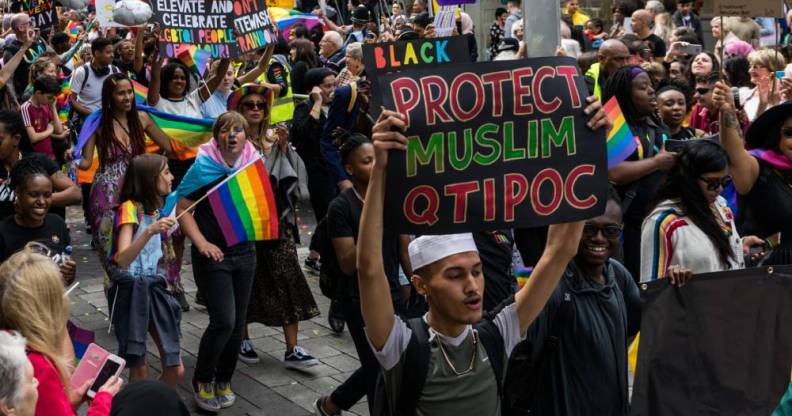This is the horrific, traumatising reality of Muslim conversion therapy and why it needs to be banned immediately

Young queer Muslims must be considered in any conversion therapy ban, an activist has warned.
As the government considers a ban on conversion therapy, Fiyaz Mughal, founder of Faith Matters and Muslims Against Antisemitism, urges the prime minister to consider the harm of Muslim therapies in any measures.
Khalid travelled to see the holy man with his mother, who sat with him in the reception area of a cold community hall as he waited to be seen. Filled with trepidation, twiddling his fingers as helpers shuffled in and out of the reception area, his time came and he was called in.
In the middle of a carpeted room sat the Pir: a copper-haired ‘holy man’ going through prayer beads as a bowl with some water and Islamic inscriptions were placed in front of him.
Khalid’s mother sat by the wall on the side of the room, relegated to a corner. Khalid sat in front of the Pir as he chanted Islamic prayers, blowed on his head as a blessing and burned paper. The session finished with a sprinkling of holy water, and clear instructions to Khalid that if he felt any sexual urges for another man, he should pray and he should return again. At no point was he to have sex with another man, or his soul could end up in eternal damnation.
On July 20, prime minister Boris Johnson made a statement that he would consider banning so-called conversion therapy after his government had carried out a study. Many will associate these therapies with Christian groups, but it is rarely raised that these practices also take place within Muslim communities.
I met Khalid when I was writing a book on those who leave Islam. His family found out that he was gay when they went through his phone. Angered, they accused him of having “let the family down” and “bringing shame to us”, as though his sexuality was responsible for the honour of the family.
Under duress and facing the threat of being thrown out of the family home, the 28-year-old agreed to see the Pir. A so-called holy man, the Pir had no qualifications, but community rumour-mongering had elevated him from an elderly man who knew his Islamic prayers to a back-healing, cancer-stopping wizard who could cure any ailment.
When I asked Khalid how he felt during his session with the Pir, he likened it to a form of exorcism. He was made to feel that he was acting against God, that he was somehow sick, that he was not normal. He felt as though he had betrayed his Islamic faith, and was scared to have sex with another man in case God would smite him.
Khalid would punch himself over his ‘evil urges’.
Over the next six months, Khalid would emotionally and physically torment himself at moments when he felt that he wanted to masturbate or when he wanted sex.
He would scold himself for his overwhelming “evil urges”, swear at himself for being so weak and punch himself as though he needed to be physically shocked out of the feelings.
After these six months he had sex with another man. Following the encounter his emotions became so twisted that he placed himself into risky situations, wrongly thinking that being violated or acquiring a sexually transmitted disease was a form of punishment that he deserved.
Fortunately, Khalid has been able to untangle the emotional damage that was caused to him because of his family’s reaction. Decades later, he told me, the conversion therapy session with the Pir is a distant memory, but one which he feels many LGBT+ Muslims have been through.
“It is time that this form of Muslim conversion therapy is highlighted and that anyone who comes across such actions by these so-called holy men report them into the police or to local authorities when a ban comes into place,” Khalid said.
“So many lives have been affected by money-grabbing sessions that cannot change the sexuality of someone and which cause, in some instances, serious emotional disturbances.”
The prime minister’s statement on conversion therapy is to be welcomed, particularly when individuals and groups are using religious edicts, emotional pressure and fear tactics to try to “cure” people, as though their sexuality could be dealt with like a disease. But as the government conducts its study, I can only hope that it looks at Muslim conversion therapy, which harms so many.

